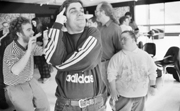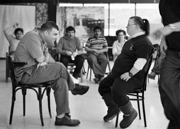

Photographer Vincenzo D’Alto was assigned to take a photo last
spring at an open house held by the Centre for the Arts in Human Development.
He was so deeply impressed that he has spent his own time this year
putting together a photo essay. Above are two of his photos. In the
top photo, participants joyfully do a movement exercise under the direction
of Professor Stephen Snow (with ponytail, towards the back). In the
other photo, two young people do a “mirroring” exercise, in
which they face each other and imitate movements and expressions.
|
by Anna Bratulic
They’ve done it before, and they’ll do it again. Concordia’s
Centre for the Arts in Human Development — including Professor Stephen
Snow, his cast of over 20 actors, most of whom have mild-to-moderate developmental
disorders, and numerous volunteers — will undoubtedly pull off the
musical they’re planning for mid-June based on the story of Pinocchio.
They have done it in the past to great acclaim with the three other original
productions— Oh! That Aladdin!, The Winds of Oz, and And
Alice Dreams — since the Centre started in 1994. They have been
so successful that the Alice production drew the attention of CBC’s
The National Magazine, which broadcast a 22-minute documentary about
the Centre two years ago.
In addition, the Birks Family Foundation recently granted the Centre a
generous grant over seven years to fund the public outreach program of
the Centre, which offers creative arts therapies in drama, art, music
and dance/movement.
Apart from the much-appreciated media attention and grant money, it is
the genuine desire to help the clients of the Centre that drives this
team. “This is therapeutic theatre based on people who normally don’t
have an opportunity for enormous self-expression,” said Snow, who
is adapting and directing the play.
At a recent rehearsal, he and the participants were on stage at the F.
C. Smith Auditorium on the Loyola campus.
Snow has a sort of reverse rehearsal method where the action comes first
and the scripts come later. For now, Snow is telling the novice actors
their lines and how they should say them. He gives clues as to how they
should move by changing his tone of voice; low and creepy when they’re
supposed to be sneaking up on somebody, loud and boisterous when there’s
a chase scene. He reminds one of the players, who is hiding behind a black
velvet curtain, that he’s missing his cue.
“We certainly have our challenges ahead of us. It’s sort of
like an obstacle course, but not one where you say, Oh, my God!, in exasperation,
but where we say, OK, how do we get that to work?‚” Snow said.
Shannon Lynch, a volunteer student from the Theatre Department, will play
the mandolin in the production; he also does one-on-one coaching with
some of the cast, many of whom have speech impediments.
One man has to begin the story with a “once upon a time” kind
of line, but he says it too quickly or forgets the line. Shannon’s
expression consists of one part surrender and one part sympathy, giving
a helpless smile as he patiently asks the participant to repeat his line.
The player, who is very proud of his character, eventually gets it with
enough prompting.
The players are genuinely funny, especially when they make mistakes, getting
squeals of laughter from one another, including a chuckle or two from
producer Lenore Vosberg, a social worker at the West Montreal Readaptation
Centre, who sat quietly observing the rehearsal in the empty seats. It
was her idea to put on the Aladdin play back in 1994, initially
as a fundraiser. The project inspired the creation of the Centre for the
Arts in Human Development, which officially opened in 1996.
Vosberg has a good memory for the particular needs of each participant.
She mentions that one of the players who has Down syndrome also has a
heart condition and should avoid running around on stage as he had been
doing. She makes a note to remind Snow of that later. Another player has
cerebral palsy and is also deaf, but she is a good lip-reader provided
that she can see the mouth of the person talking to her.
“Once I noticed the set designer had included a flashing light as
part of the set. We have some people with epilepsy and I went to them
and said, You can’t put that flashing light in the show. It might
trigger an epileptic seizure,” she said.
Vosberg obviously wants the play to be another success, but what really
matters to her is what the Centre’s participants, who immediately
strike the outsider with their touching friendliness and childlike enthusiasm,
get out of it.
“The performance, for us, is not as central as the therapeutic value.
As long as they enjoy the creative arts we feel that we can help them
with their self-confidence, social skills and self-esteem. They get to
show what they can do, and they get to show it in the spotlight in front
of other people which makes them feel like they’re doing something
important, and they don’t usually get to feel that.”
This year, the Centre has recruited eight volunteers from Venture High
School, an alternative secondary school in Ville Émard. As part
of the program, students come in twice a week to help out with the play
while having to maintain good grades at school. A small chorus will sing
some of the original songs which are being composed by Shelley Snow. Songs
from past productions have been recorded onto CD, called I Can, which
is sold at the Concordia Bookstore and on the Internet, and centrefortheartsinhumandevelopment.com.
Showtimes for The Legend of Pinocchio are June 15 (7:30 pm, tickets $15),
and June 16 (2 pm, tickets $10) at the F. C. Smith Auditorium. Book in
advance by calling 848-8616. There are also two dress rehearsals on June
13 and 14 (10 am, tickets $4), also at the F. C. Smith Auditorium which
schoolchildren are encouraged to attend. For information and booking call
Alie at 848-8619.
|
|
|



